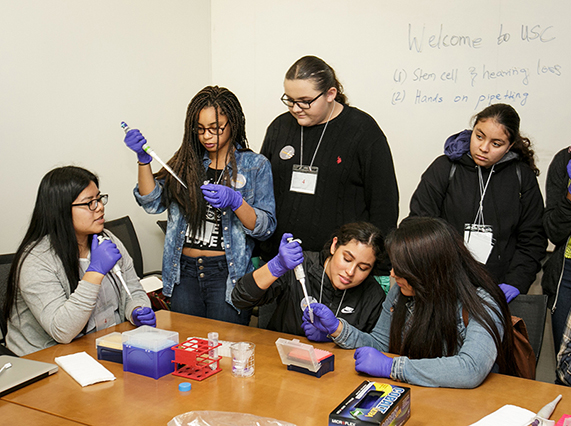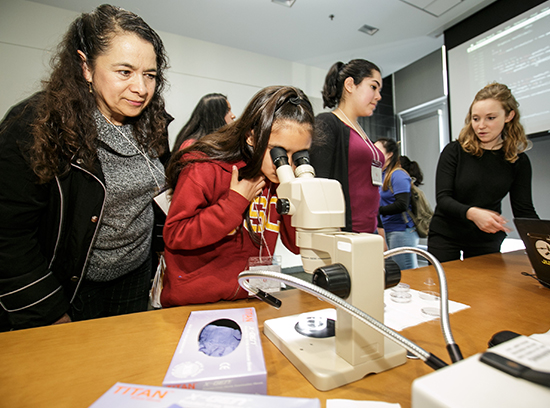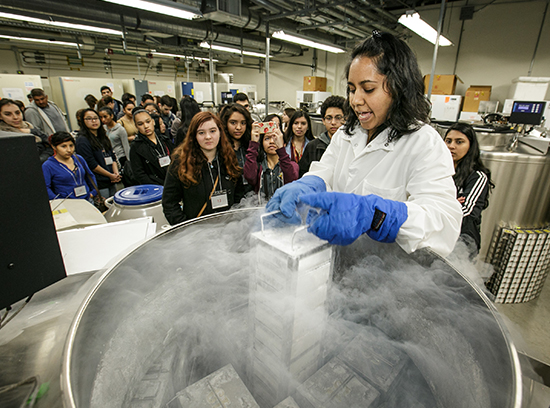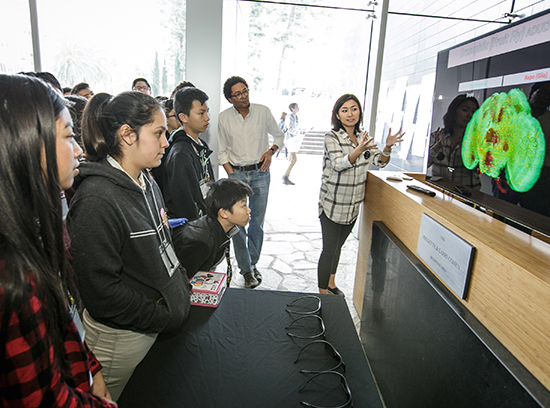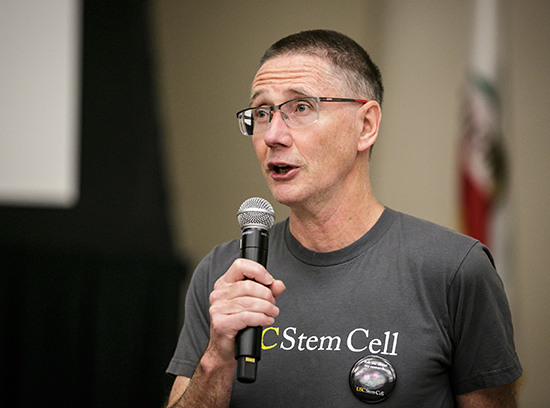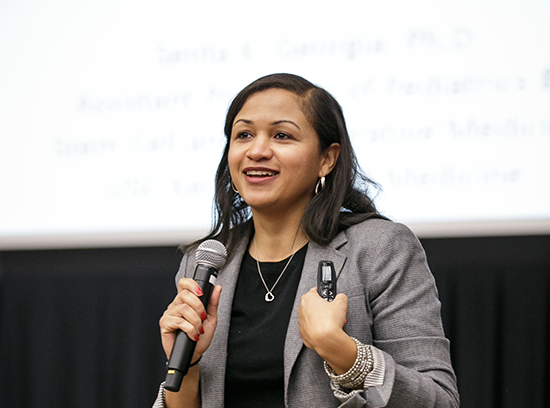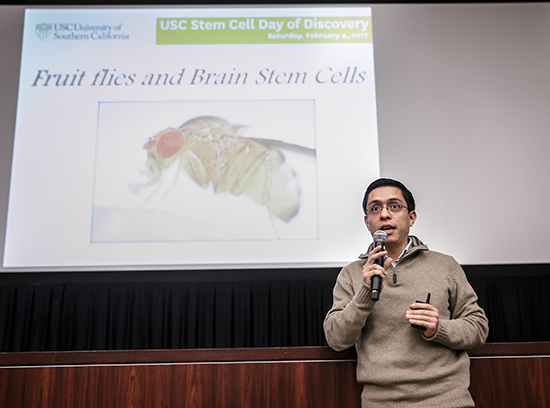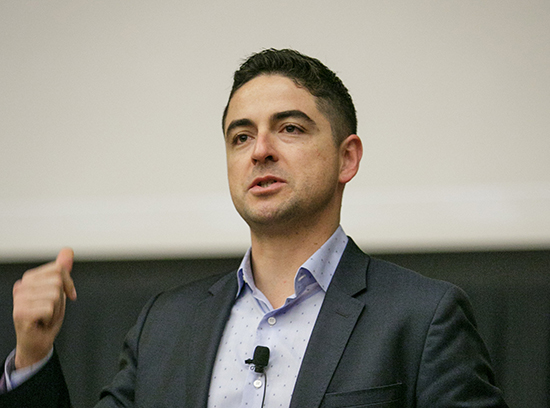
You can be anything you want—just like a stem cell. This was a key lesson for the 500 middle and high school students who attended the USC Stem Cell Day of Discovery on Saturday, February 4, on the Health Sciences Campus of the Keck School of Medicine of USC.
“It was a true joy to welcome the middle and high school students from our neighboring communities in Boyle Heights, El Sereno, Lincoln Heights, the San Gabriel Valley and throughout Los Angeles,” said Rohit Varma, dean of the Keck School of Medicine of USC. “This bright young generation brings tremendous potential to their future pursuits in biotechnology and beyond.”
Hosted by USC Civic Engagement and USC Stem Cell, the event introduced the students to stem cell scientists at all stages of their careers—from undergraduates to postdoctoral scholars to world-renowned investigators.
“I want to emphasize one thing,” said Andy McMahon, director of the Eli and Edythe Broad Center for Regenerative Medicine and Stem Cell Research at the Keck School of Medicine of USC. “Just don’t be shy. Ask our scientists questions. Ask them about their science, but also ask them about their personal journeys that led to where they are. We hope this is a true Day of Discovery for all of you.”
The students followed McMahon’s advice and their own curiosity as they engaged in games, hands-on demonstrations and lively conversations about stem cell science. They attended a research poster session where they could meet USC Stem Cell faculty, and a resource fair featuring biotech-related volunteer and educational opportunities available across the university. They also toured Keck Hospital of USC, as well as labs in the USC Norris Comprehensive Cancer Center.
In the lobby of USC’s stem cell research center, middle and high school students competed as contestants on the Stem Cell Edition of Family Feud. USC PhD student Eric Hendricks served as game show host.
“Name one of the top eight diseases that can benefit from stem cell therapy,” he said. “I heard cancer first. Survey says … yes!”
In a sandbox outside, remote control bulldozers demonstrated the work of two key cell types: one that clears away worn out bone, represented by brown sand; and another that builds new bone, represented by red sand.
Operating a remote control, sophomore Edgar Sanchez from Linda Marquez High School explained: “I came today because the name USC and medical fields intrigued me. And I actually want to be something in the medical field, and I wanted to check it out. So far, I’m liking it!”
At a nearby computer station, other students donned 3D glasses to view colorful microscopy of brains and kidneys. They then ventured into labs to get hands-on with microscopes, pipettes and other tools of the trade.
The middle and high school students also received a first look at a stem cell videogame for smartphones, currently under development by USC PhD students Julia Rose Taylor and Kristina Tatiossian. The objective of the game is to direct a stem cell to differentiate into the various cell types in the body.
“Then you’ll be able to take these cell types, and if you’re good at it, you’ll be able to make a human,” Taylor explained. “And if you’re bad, maybe you end up with a bag of flesh with one eye and three noses.”
The middle and high school students not only posted on social media, but also on giant post-it notes—which formed a colorful mural on the black granite facade of USC’s stem cell research center. Written in multi-colored marker, messages like “stem cell is our future,” “keep calm, science on” and “USC is my goal” soon adorned every available inch of wall.
Three juniors from Reseda High School shared their motivations for spending their Saturday at the university.
“California currently has biotechnology as the biggest growing sector,” said Richard Coca. “Right now, it’s really important that students are visiting labs and learning more about the industry, so they can potentially see where they’re going with their lives and careers.”
“I’m just thoroughly interested in all the sciences, all the science I can get at,” said Rose Griesgraber.
Alondra Rosas added: “It’s just fun to be here, also.”
Earlier in the day, the students enjoyed hearing from Senta Georgia, a USC Stem Cell researcher with a lab at Children’s Hospital Los Angeles. Growing up in New Jersey, Georgia dreamt of becoming a paleontologist, then an archeologist, then a whale biologist, but ultimately came to a pivotal realization: “I love science, because I love people.” She now dedicates her energies to finding stem cell-based treatments for diabetes.
Sophomore Jera Alonso from Orthopaedic Hospital Medical Magnet High School “was really interested in that because almost everybody in my family has diabetes,” putting her at risk for the disease. Listening to Georgia’s remarks left Alonso inspired about the potential of regenerative medicine.
During another talk, Ismael Fernández-Hernández, a postdoctoral fellow in the Eli and Edythe Broad Center for Regenerative Medicine and Stem Cell Research at USC, shared his lifelong fascination with how things work—which motivated him to leave his hometown of Guadalajara, Mexico, to pursue educational opportunities in Spain, Switzerland and the US. Fernández-Hernández is currently using stem cell technology to search for ways to counteract brain degeneration from disease, aging or injury.
Throughout the festivities, Felipe Osorno, associate administrator of performance management for Keck Medicine of USC, served as a lively Master of Ceremonies.
“The exposure to the Keck School of Medicine of USC is invaluable for the students,” said Maria Elena Kennedy, a consultant to the Bassett Unified School District, who is implementing a biotechnology academy. “Our students come from a Title I School District, and they don’t often have the opportunity to come to a campus like the Keck School of Medicine.”
Another educator, Rafael Cruz from Hollenbeck Middle School, also attended USC’s October community education event “Preparing for the Biotech Decade,” which encouraged families in East Los Angeles to prepare for opportunities related to the STEM disciplines of science, technology, engineering and mathematics. The USC Stem Cell Day of Discovery provided a seamless continuation as he engages his students in this growing sector of the economy.
“Where are the jobs at? Medical or technology or biotech,” he said. “So we want to get our kids ready for that, so they’re ready for the new economy and how to get jobs.”
Participating East Los Angeles schools included Hollenbeck Middle School, El Sereno Middle School, Wilson High School, Abraham Lincoln High School, Theodore Roosevelt Senior High School, Felicitas & Gonzalo Mendez High School, Francisco Bravo Medical Magnet High School, Sacred Heart High School and USC East College Prep. Several regional schools with a focus on biotechnology and medicine also attended, such as Bassett High School, Huntington Park Institute for Applied Medicine (HPIAM) at Marquez High School, Reseda High School and Orthopaedic Hospital Medical Magnet High School.
In addition to students, teachers and parents, the event welcomed leaders from the community, business and biotech sector, and local government, who gathered to show their support.
Together with these partners, USC will continue to build the future of Los Angeles as an incubator for the biosciences and as a world leader in stem cell research.
“As USC continues the important work of expanding our biomedical research to increase our body of knowledge and to diagnose and then develop successful ways to treat the many disorders that affect our quality of life, we will not walk this path alone,” said Earl C. Paysinger, vice president of USC Civic Engagement. “Instead, we will do so in collaboration and with the strong support of the people in our communities. It is to them and countless others that we deeply commit ourselves to improving their lives—and the lives of the children today, tomorrow and for generations to come. That is our pledge.”




